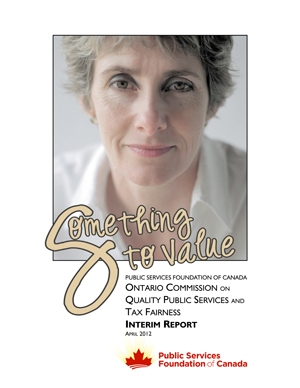This is an archive of news stories and research from the National Union of Public and General Employees. Please see our new site - https://nupge.ca - for the most current information.
“Austerity,” she said, “is not the remedy. Austerity will only increase inequality and push up demand for public services. It will reduce government revenues and drive up the deficit over time.”
 Toronto (12 April 2012) – Reducing income inequality is the key step to maintaining quality public services in Ontario, according to an interim report released today by the Public Services Foundation of Canada (PSFC).
Toronto (12 April 2012) – Reducing income inequality is the key step to maintaining quality public services in Ontario, according to an interim report released today by the Public Services Foundation of Canada (PSFC).
“Overwhelmingly, we heard that income inequality is a major cause of the current recession and why the recovery (in Ontario) is so weak,” Judy Wasylycia-Leis, chair of the Foundation, told news conferences in Toronto and Sudbury. Wasylycia-Leis, a former federal Member of Parliament, conducted public hearings across the province in January and February, where she heard evidence on the health of public services in Ontario and on how they can be sustained through progressive tax reform.
“Experts told us how increased inequality is linked to social problems that increase the cost of public services,” Wasylycia-Leis said. “We heard that you don’t deal with the deficit in a way that fails to consider, or is indifferent to, the issue of income inequality and its associated costs.”
The 96-page interim report released today by the PSFC contains 16 recommendations on ways that Ontario can maintain quality public services – despite per capita spending in the province that ranks third last among Canadian jurisdictions – by implementing measures to increase funding through moderate tax reform that would increase revenues to the provincial government.
For example, the Commission recommends the immediate restoration of the corporate tax rate to 14 per cent, a move that would generate $2.5 billion in revenue. Additionally, the treasury could add $1.8 billion by reversing the elimination corporate capital tax. By implementing a two per cent increase on personal income tax for those earning more than $500,000 a further $500 million could be generated annually.
“We believe these are very reasonable revenue-generating measures that, unfortunately, neither Don Drummond nor the provincial government have given much thought to,” said Wasylycia-Leis.
At the news conferences in both cities, Wasylycia-Leis said economists who testified at the hearings said that a $15 billion drop in revenues due to the recession and a $16 billion drop in revenues caused by tax cuts largely explain the deficit.
“Austerity,” she said, “is not the remedy. Austerity will only increase inequality and push up demand for public services. It will reduce government revenues and drive up the deficit over time.”
At the request of the Ontario Public Service Employees Union (OPSEU/NUPGE) – and in response to the McGuinty government’s creation of the Drummond Commission on reform of public services in Ontario – the PSFC established the Commission on Quality Public Services and Tax Fairness in the autumn of 2011. Wasylycia-Leis was named chair of the Commission and conducted an intensive six-week tour of a dozen cities in Ontario where she received more than 1,000 oral and written presentations from providers and users of public services; experts in progressive tax reform, public policy planners, and from ordinary citizens who described the value of public services in their communities and in their personal lives.
Public hearings and town hall forums were held in Kingston, London, Ottawa, Peterborough, Oshawa, Thunder Bay, Toronto, Hamilton, Windsor, Owen Sound, Sudbury and Sault St. Marie.
She contrasted the approach taken by her Commission with that adopted by the Drummond Commission.
“Unfortunately, the mandate of the Drummond Commission ignored the revenue side and avoided public consultations,” she said. “We took the opposite approach.”
Among the 16 recommendations contained in Wasylycia-Leis’ interim report are calls for reviewing privatization initiatives by the provincial government; a ‘Fairness Test’ that assesses the key tax and spending impacts on income inequality; a proclamation by Ontario that commits the provincial government to core values that underlie public services; and, a comprehensive plan that articulates and communicates to Ontarians the social and economic values of quality public services.
The full Interim Report can be read at: www.publicservicesfoundation.ca
More information:
Public Services Foundation of Canada
NUPGE
The National Union of Public and General Employees (NUPGE) is one of Canada's largest labour organizations with over 340,000 members. Our mission is to improve the lives of working families and to build a stronger Canada by ensuring our common wealth is used for the common good. NUPGE
